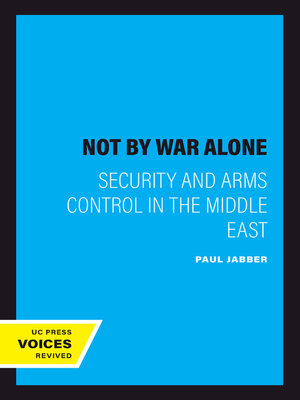
Sign up to save your library
With an OverDrive account, you can save your favorite libraries for at-a-glance information about availability. Find out more about OverDrive accounts.
Find this title in Libby, the library reading app by OverDrive.



Search for a digital library with this title
Title found at these libraries:
| Library Name | Distance |
|---|---|
| Loading... |
The Middle East remains the most politically volatile and militarily unstable region in the world. It is also in relative terms the most heavily armed; and the influx of American, Soviet, French and other weaponry continues unabated. Moreover, the Arab-Israeli conflict invites competition in nuclear armaments. Accordingly a concern of public policy must be the promotion of strategic stability between potential adversaries and the imposition of effective restraints on the several interrelated arms races in the region. In the absence of negotiated solutions to existing disputes, or as a feature of future peace accords, arms-control measures could be of crucial importance in preventing the outbreak of war. Jabber explores the prospects for arms control in the specific contexts of the Arab-Israeli dispute and of military developments since the war of October 1973. Seeing lessons from history, and drawing on previously untapped materials, he includes a case-study of an actual Middle East arms-control system that was instituted by the United States, Great Britain, and France under the Tripartite Declaration of May 1950. Designed to prevent further warfare after the establishment of Israel by maintaining a stable balance of power through the rationing of arms supplies, this agreement was soon circumvented by its French sponsors, and it collapsed altogether following the emergence in 1955 of the Soviet Bloc as a major source of arms. After analyzing the Tripartite system—-a unique experiment in coordinated, long-term, multilateral arms control on a regional level—Mr. Jabber defines the basic requirements for effective and curable international accords of this kind by exploring the relationships among the international arms trade, the purposes of arms control, and the political objectives and security interests of both suppliers and recipients of arms.
The Middle East remains the most politically volatile and militarily unstable region in the world. It is also in relative terms the most heavily armed; and the influx of American, Soviet, French and other weaponry continues unabated. Moreover, the Arab-Is
The Middle East remains the most politically volatile and militarily unstable region in the world. It is also in relative terms the most heavily armed; and the influx of American, Soviet, French and other weaponry continues unabated. Moreover, the Arab-Is







